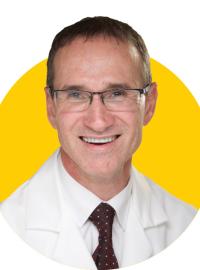Table of ContentsClose
Ted Abel, PhD, and Lane Strathearn, MBBS, PhD, are leading one of only 15 federally funded intellectual and developmental disabilities research centers in the country. The new Hawk-IDDRC [Hawkeye Intellectual and Developmental Disabilities Research Center] integrates the efforts of researchers in the Iowa Neuroscience Institute (INI) and clinicians in the Center for Disabilities and Development (CDD), part of University of Iowa Stead Family Children’s Hospital, to connect basic and clinical research across the lifespan.
The initiative is tailored to an underserved rural population and focuses on the prevention, diagnosis, and treatment of intellectual and developmental disabilities.
“To move research forward in this field, there has to be a collaboration between clinicians, who are actually seeing and treating individuals with intellectual disabilities, and the basic science researchers, who are doing research on neural circuits, genetics, epigenetics, and more,” says Strathearn, professor of pediatrics and physician director of the CDD. “The IDDRC is breaking barriers by helping clinicians and basic scientists work together to ensure that our research questions reflect the most important clinical problems we are seeing in children.”
Strathearn and Abel, director of the INI, discuss the new center’s statewide goals in improving care for this patient population.
CONNECTING RESEARCH TO CLINICAL CARE
Gabby Yoder, a 2019 Kid Captain (see above), sees pediatric experts at the Center for Disabilities and Development to help with motor and balance issues. Born with a a congenital heart defect, Yoder has had three major heart surgeries. Additionally, she's undergone corrective eye surgeries and was diagnosed with thrombocytopenia, a condition in which she has a low platelet count. Doctors are working to better understand her muscle and balance issues, and how it may tie into these other conditions.
The Hawk-IDDRC aims to help patients like Yoder by conducting research to better inform clinical care for intellectual and developmental disabilities.

TED ABEL, PHD
- Co-director, Hawk-IDDR
- Director, Iowa Neuroscience Institute
- Professor, Chair, and Department Executive Officer, Department of Neuroscience and Pharmacology

LANE STRATHEARN, MBBS, PHD
- Co-director, Hawk-IDDRC, UI Autism Center
- Division Director, Developmental and Behavioral Pediatrics
- Physician Director, Center for Disabilities and Development
Why was the University of Iowa a good candidate for the IDDRC designation?
Strathearn: The Association of University Centers on Disabilities supports a national network of university-based interdisciplinary programs, two of which were already operational here at Iowa. The CDD has been Iowa's University Center for Excellence in Developmental Disabilities since 1972. It houses a Leadership Education in Neurodevelopmental Disabilities program. The addition of the IDDRC makes us one of only a few universities in the country to have all three federally funded programs under a single roof.
Abel: I think what set our proposal apart was our focus on intellectual and developmental disabilities across the lifespan. We need more people thinking about what happens as individuals with developmental disorders age and develop. Right now, there are fewer and fewer resources available as they get older. With the increase in prevalence of neurodevelopmental disorders in the last 20 years, we are going to have more children developing into adults with disabilities, and we will be challenged in how to help them. We are also focused on the developmental origins of these disorders, starting in utero. I think we are the only IDDRC with an OB-GYN physician as a core director—Mark Santillan, MD (09F, 16PhD), directs our clinical and translational core.
How is the IDDRC impacting patients across the state?
Abel: We aim to develop a better understanding of these disorders that will improve diagnosis and treatment across the state. With that knowledge, we can work to build awareness and acceptance and break down stigma. Iowa has Child Health Specialty Clinics around the state that are key partners in our work in the IDDRC. The staff includes family navigators, who are often parents of children with special needs who work with parents of newly diagnosed children.
Strathearn: We will also be working with the Child Health Specialty Clinics to connect with OB-GYN providers around the state and recruit pregnant women for research that follows them and their children from the third trimester through the first few years of life. In this study, parents use a smartphone app called BabySteps to send videos of infant behavior and collect other data. This allows us to screen for children with developmental delays or symptoms of autism in real time instead of waiting several years and relying on past recollection of behaviors. This is a great example of the connections we are seeking with other organizations in communities throughout rural Iowa.
You both have worked in the area of intellectual disabilities for decades. What does it mean to you personally to see the center come to fruition and know that you’ll be able to offer insights and services to families that haven’t previously been available?
Strathearn: As director of the CDD, I am proud of the resources and services we have in place to help people move from referral to clinical evaluation to recommended treatment and interventions. The Hawk-IDDRC adds a research component to that. Families who are already working with us can contribute to the research, so the studies we conduct can help us better understand intellectual and developmental disabilities and provide even better care for the next generation of families.
Abel: As a parent of a young adult with disabilities, I have experienced firsthand the overwhelming feeling of trying to find our way through a series of unknowns. For over 21 years, my wife and I have worked daily to help our son navigate the world around him. Connection to other families, therapists, and clinicians helped us gain perspective on what the journey can be like and how it can be fulfilling for all of us. To me, the research and the Hawk-IDDRC are energizing and supportive, and I hope that we’re able to provide that to the next generation of parents and families who navigate their way through these disorders.
